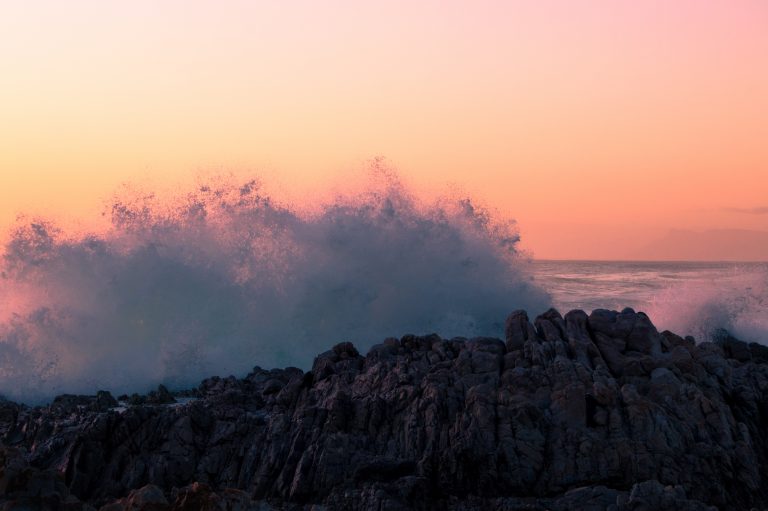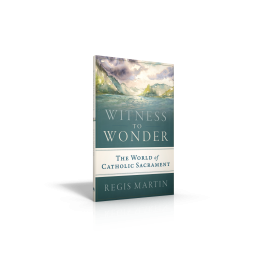By Regis Martin
Regis Martin is the author of over half a dozen books, including Witness to Wonder: The World of Catholic Sacrament. With his trademark mastery of the English language, Martin leads the reader to contemplate the wonders of God and his creation.

I will leave to the statisticians an exact inventory, but by my reckoning there are ninety-two references to creation in the Catechism of the Catholic Church (CCC), only six of which are less than glowing. And these few, testifying as they do to the disorders into which we have fallen, remind us of a good thing gone bad, that the evil we do is not the fault of anything God made, rather our willful and perverse misuse of it.
And so, drawing upon the Church’s depositum fidei, the evidence points to the sheer goodness of a world whose provenance can only be found in God. Springing forth from a source of inexhaustible goodness, creation necessarily shares in the goodness of its Creator. “And God saw that it was good,” we are repeatedly told in the Book of Genesis, “very good” (1:4, 10, 12, 18, 21, 31). He intended all of it as pure gift, entrusting to us all that He made, both to rejoice in and to care for.
But creation is not merely a matter of divine goodness. The world wrought by the hand of God reveals His beauty as well. And in its reflection of that infinite beauty, we are invited to reverence the world, seeing in it so many glints of a glory without end. Indeed, to give thanks to God for a gift which none of us could ever give.
Here is the great and enduring truth on which the whole of sacred scripture opens. The truth on which an entire sacramental system depends. That the world we inhabit is a created place, and thus chockful of meaning and purpose. Not a single particle of which does it give to itself; instead, it receives all from Another, from God. Luigi Giussani tells us in The Religious Sense that, “the world, this reality into which we collide, unleashes a word, an invitation, a meaning as if upon impact. The world is like a word, a ‘logos’ which sends you further, calls you on to another, beyond itself, further up.”
Everything speaks to us of God. Not only does Dante speaks to us of God but, as Eric Gill liked to say, “so do the daisies, the dew drops and the dung.” The world, then, is a kind of sacrament, whose material configuration points to—signifies—the presence of Another. Of One who not only brought it into being but, from moment to moment, sustains that being, holding it effortlessly above an abyss of nothingness. “We are,” says Frank Sheed, “so many examples of nothingness brought in being—held in being—by Omnipotence.” Who, at every turn, summons us to take pleasure in, basking amid so many good and beautiful things. And thus to acknowledge, in truth, the work of this Supreme Artist, whose signature is splayed upon a canvas not in the least bit empty, but everywhere teeming with unmistakable signs of His majesty and grandeur. A world that will, as the poet Hopkins exults, “flame out like shining from shook foil . . . gathering to a greatness like the ooze of oil.”
Why does the world not implode? What keeps it from a final shipwreck? Because, for all the depredations of wicked men, for all that we persist in profaning so dear and fragile a creation, there yet lives “the dearest freshness deep down things;
And though the last lights off the black West went
Oh, morning, at the brown brink eastward, springs—
Because the Holy Ghost over the bent
World broods with warm breast and with ah! bright
wings. (God’s Grandeur, Gerald Manley Hopkins)
If the world can only exist as a word spoken by Another, by the eternal Word, then surely the primary obligation of man is gratitude, of giving thanks to God for the inestimable privilege of being alive. “When a man loses everything in life except life, what will enable him to survive?” That was the question Victor Frankl put to himself, and to all the inmates fated to suffer the horrors of a Nazi Concentration Camp. And only where there was something greater than life, a thing more urgent even than the effort merely to soldier on, would it be possible to say: Yes, I have found something for which no barrier can impede the upward surge of my soul, because God, the meaning of being, beckons me onward, soliciting my freedom to reach for the highest possible horizon. When that happens, the only appropriate attitude is to give thanks.
This is the basic affirmation that alone guarantees everything. Which we are to offer in the teeth of whatever torment life inflicts. So foundational is this assent that, as Josef Pieper tells us, “we must attribute it even to martyrs, at the very moment, perhaps, that they perish under brutal assault.” What precisely distinguishes the Christian martyr, he adds, “is that he never utters a word against God’s Creation. In spite of everything he finds the things that are ‘very good’; therefore, in spite of everything he remains capable of joy.”
To know why there is being and not nothingness, to know that there is a God who delights in making being be, is the first step in seeing all things sacramentally. Even in our brokenness, we are able, precisely through the prism of sacrament, to see, and thus to receive, the world as the handwork of a good and generous God.
You Might Also Like

Witness to Wonder deepens the reader’s appreciation for the Sacraments by igniting in them a passion for the grandeur and sweep of the Church’s overall sacramental vision. The book aims at nothing less than to try to enrapture them for a world where not just matter and form but wonder and delight are at the center of our understanding of the Sacraments.